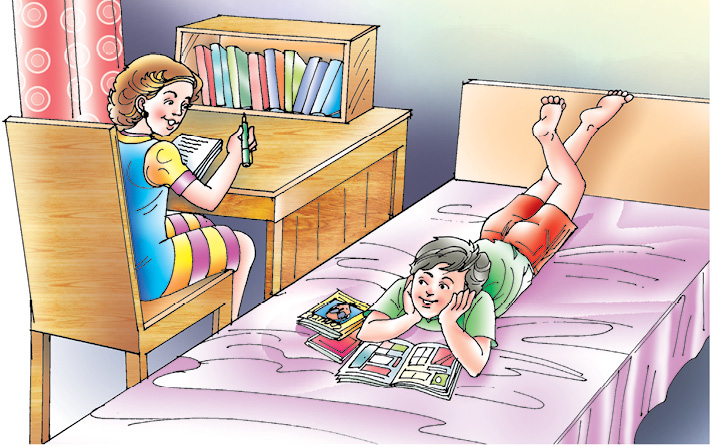Table of Contents

6
Before you read
Nishad, a boy of seven (also called Seven because his name means the seventh note on the musical scale) and his ten-year-old sister Maya are very curious about one Mr Nath. Then one day the children’s marble rolls into Mr Nath’s room, and Nishad gets a chance to see him. Is he a crook on the run? Why is his face badly scarred? Why has he no friends?
Nishad’s mother, a doctor, knows Mr Nath as a patient, who is very polite.
Expert Detectives
I
As we walked back towards the clinic Seven said, “He doesn’t look anything like a monster, Maya. But did you see how thin he is? Maybe he’s very poor and can’t afford to eat.”
“He can’t be poor if he’s a crook on the run,” I told him. “He’s probably got millions of rupees stashed away somewhere in that room.”
stashed away: hidden away
“Do you really think he’s a criminal, Maya? He doesn’t look like one,” Nishad looked doubtful.
“Of course he’s one, Seven,” I said, “and
he certainly isn’t starving. Mr Mehta told us
that Ramesh brings his meals up from the restaurant downstairs.”

“But Maya, Mr Mehta told us he doesn’t work anywhere, so how can he possibly have money to pay for food?” Nishad said.
“Exactly!” I exclaimed. “He must have lots of money hidden somewhere, maybe in that trunk in his room. It’s probably full of silver and gold and jewels and...”
“What rubbish,” Nishad interrupted.
“I know I’m right, stupid,” I told him. “By the way, Seven, did you see his scars? I couldn’t, it was too dark, but I bet he got them during a shoot-out with the police or something.”
“Mummy told us quite clearly they were burn scars,” Nishad said firmly.
“Perhaps the police had to set his house on fire to force him out,” I suggested. Seven looked unsure.
On the Monday following Mamma’s birthday, Seven went alone with her to the clinic at Girgaum as I was spending the evening with a schoolfriend. When they returned, Nishad told me he’d been to see Mr Nath and I felt most annoyed that I hadn’t been there.
following: coming after
gaunt: sickly
peek: look quickly and secretively
Seven had been quite upset about Mr Nath’s gaunt appearance and was sure that he was starving. He told me that he had knocked loudly on Mr Nath’s door that evening and said, “Open the door quickly, Mr Nath.”
The man had opened it and asked him, “Lost another marble?”
He had obviously recognised my brother.
“No,” said Nishad. He had taken the man’s hand in his own, and thrust a bar of chocolate into it.
“Did you get a chance to peek into the trunk, Seven?” I asked.
Nishad looked disappointed. “He didn’t even ask me in,” he said. Then he smiled. “But I did find out something, Maya. I went down to
the restaurant where Ramesh works and talked to him.”
“Good for you, Mr Detective,” I said, patting him on the back, “I hope you questioned him properly.”
Seven looked pleased. “Ramesh told me that he takes two meals for Mr Nath every morning and evening, and two cups of tea, one in the morning and one in the afternoon. Ramesh says he’s not very particular about what he eats, it’s always the same food — two chapattis, some dal and a vegetable. Mr Nath pays cash and tips well.
“Ramesh told me something very strange, Maya,” Seven added. “Almost every Sunday, he carries two lunches to Mr Nath’s room and the same man is with him each time. He’s tall, fair, stout and wears spectacles. Ramesh says his visitor talks a lot, unlike Mr Nath who hardly speaks.”
tips well: gives a generous tip (money in thanks for services)
sort out: arrange systematically
crook: criminal (informal)
“Well done, Nishad,” I told him. “Now that we’ve made some progress with our inquiries, we’ll have to sort out all the facts like expert detectives so that we can trap the crook.”
“How you do go on, Maya,” Seven sighed. “How can you possibly imagine he’s a crook? He looks so ordinary!”
“Criminals can look quite ordinary, smarty,” I retorted. “Did you see the picture of the Hyderabadi housebreaker in the papers yesterday? He
looked like any man on the street.” Nishad
looked doubtful.
The monsoons broke the next day. Dark clouds accompanied by blinding flashes of lightning
and roaring rolls of thunder burst with all
their fury, flooding the streets with a heavy downpour. School was to have reopened after the
summer holidays, but no traffic could move through the flooded roads and there was an unexpected holiday.
I thought I’d spend the time usefully. I sat at my desk in our bedroom with a sheet of paper before me.
Comprehension Check
1. What did Nishad give Mr Nath? Why?
2. What is “strange” about Mr Nath’s Sundays?
3. Why did Nishad and Maya get a holiday?
II
I wrote in large block letters:
CATCHING A CROOK
Then I began writing. About half an hour later, I turned towards Seven who was lying on his tummy, chin cupped in his palms, reading comics. “Want to hear what I’ve written?” I asked.
by appoint-ment to: officially chosen (by someone important)
He looked up questioningly. “I’ve listed all the facts we know about Mr Nath which might help us to trap him,” I said. “Want to hear?”
Seven nodded.
“Fact Number1,” I read, “his name is Mr Nath. We must discover his first name.”
“Do you think that’s his real name, Maya?” Nishad asked.
“Probably not,” I said. “Most crooks have an alias.” I added a big question mark after Nath.

“Fact Number 2,” I read on, “the tenants at Shankar House say he’s mad, strange and unfriendly.
“Number 3, he doesn’t talk to anyone and is mannerless.”
“But he did talk to us, Maya, and Mamma says he’s very polite,” Nishad interrupted.
“He only talked to us because he had to,” I said, “and since he was under Mamma’s medical treatment, he had to be polite.
alias: an alternate name
“Fact number 4, he doesn’t receive any letters.”
Seven nodded.
“Number 5, he’s been living in Room 10 of Shankar House for more than a year,” I continued.
“Number 6, he doesn’t work and sits in his room all day.
“Number 7, the kids in Shankar House and even some of the grown-ups are scared of him.
“Number 8, he has no visitors except for a spectacled, fair, fat man who visits him on Sundays for lunch.
“Number 9, food and tea are taken to his room by Ramesh from the restaurant downstairs. He doesn’t care what he eats, pays his bill immediately and tips well. That ends my list. Have I forgotten anything, Seven?”
Nishad had obviously not been paying too much attention to my list of facts. All he could say was, “Poor man, Maya, he must be so lonely if he doesn’t have any friends.”
“How can a crook have friends, idiot?” I
almost shouted.
“At least he has one friend, the one who meets him on Sundays,” said Nishad.
A brilliant thought occurred to me just then. “That man must be Mr Nath’s accomplice in crime,” I said. “Maybe he keeps all the loot and he comes now and then to give part of it to his partner, Mr Nath, for expenses. That’s it! I’m sure I’m right.”
accomplice: a helper in crime
“If you insist on calling him a criminal, I don’t think I want to discuss anything with you, Maya,” said Nishad angrily. “He can’t be such a bad man if he gives Ramesh such generous tips.”
“Ramesh probably knows something about his past, so Mr Nath must be bribing him to keep quiet,” I said.
Nishad glared at me with his arms tightly crossed across his chest. I was beginning to get fed up with him.
“How can we make any progress with our investigations if you take that attitude, Seven?”
I asked.
“I’ll cooperate only if you give up this idea about him being an escaped crook,” said Seven. “You really make me angry.”
I almost hit him. “I make you angry, you stupid oaf,” I shouted. “You make me mad! What is the point of all these enquiries if he’s not a crook? If you think he’s a nobody, what’s the idea of bothering about him, please tell me?”

Nishad looked thoughtful. “I’d like to find out why he’s so thin and why he’s so lonely. I want to know why he doesn’t have any friends and lives alone.”
“Try to understand, Seven,” 1 told him, “if he’s lived in Shankar House for a year and hasn’t made a single friend, there’s something wrong. He’s obviously scared that someone will recognise him and give him up to the cops.”
“Maybe no one’s tried to make friends with him,”
Nishad protested.
“Why should anyone bother? You’ve seen what a nasty bear he is,” 1 said.
“1 don’t care,” said Nishad stubbornly, “1 like him and I’m going to try and be his friend.”
“Friends with a crook! Ha! You’re crazy, Seven,”1 said. “The cops will take you to jail with him. Do you want that to happen, you idiot?”
Nishad merely glared at me and quietly walked out of the room. My theories seemed to have made no impression on him at all.
Sharada Dwivedi
[from The Broken Flute]
Working with the Text
• What he eats
• When he eats
• What he drinks, and when
• How he pays
2. Why does Maya think Mr Nath is a crook? Who does she say the Sunday visitor is?
3. Does Nishad agree with Maya about Mr Nath? How does he feel about him?
Working with Language
1. The word ‘tip’ has only three letters but many meanings. Match the word with its meanings below.
(i) finger tips – be about to say something
(ii) the tip of your nose – make the boat overturn
(iii) tip the water out of – the ends of one’s fingers
the bucket
(iv) have something on – give a rupee to him,
the tip of your tongue to thank him
(v) tip the boat over – empty a bucket by tilting it
(vi) tip him a rupee – the pointed end of your nose
(vii) the tip of the bat – if you take this advice
(viii) the police were – the bat lightly touched tipped off the ball
(ix) if you take my tip – the end of the bat
(x) the bat tipped the ball – the police were told, or warned
2. The words helper, companion, partner and accomplice have very similar meanings, but each word is typically used in certain phrases. Can you fill in the blanks below with the most commonly used words? A dictionary may help you.
(i) business 
(ii) my  on the journey
on the journey
(iii) I’m mother’s little  .
.
(iv) a faithful such as a dog
such as a dog
(v) the thief’s 
(vi) find a good 
(vii) tennis/ golf / bridge 
(viii) his  in his criminal activities
in his criminal activities
3. Now let us look at the uses of the word break. Match the word with its meanings below. Try to find at least three other ways in which to use the word.
(i) The storm broke – could not speak; was too sad to speak
(ii) daybreak – this kind of weather ended
(iii) His voice is beginning – it began or burst to break into activity
(iv) Her voice broke and – the beginning of daylight
she cried
(v) The heat wave broke – changing as he grows up
(vi) broke the bad news – end it by making the workers submit
(vii) break a strike – gently told someone the bad news
(viii) (Find your own expression. Give its meaning here.)
Speaking
1. Play detectives with each other. Find a person in your class (or some other acquaintance) to speak to. Find out the answers to the questions given below. Be careful to ask your questions in a polite and inoffensive way. Do not force the person to answer you. Then allow the person to ask you the same questions.
(i) Name?
(ii) What newspapers or magazines does the person read?
(iii) How long has the person lived at the current address?
(iv) What does she/he do during the day, i.e. the daily routine?
(v) What do neighbours and friends say about the person?
(vi) Who are his/her visitors and what are his/her eating habits? (You can ask a few others about this.)
(vii) What do you think about the person?
Writing
1. Who do you think Mr Nath is? Write a paragraph or two about him.
2. What else do you think Nishad and Maya will find out about him? How? Will they ever be friends? Think about these questions and write a paragraph or two to continue the story.
3. Conducting a Survey




Step I: Study the following questionnaire and discuss the points in small groups.
A home is a place where
Yes No Don’t
know
• you feel secure and happy.
• you can be alone.
• you can keep all your things.
• you can bring up a family.
• you can invite friends/relatives.
• you can make a noise if you want to.
• you can do whatever you like.
• you are at peace.
• you can look after your parents.
• you receive and give love.
Step II: Collect information. Contact people in the school/your locality and put these questions to them.
Tick-mark () their answers in the relevant column.
Step III: Analyse the results in the group by asking
• How many people think that a home is a place where you feel secure and happy?
• How many people think that a home isn’t a place where you feel secure and happy?
• How many people don’t know about it?
• Most people think that...
• Few people think that...
• Hardly anyone thinks that...
• No one thinks that...
Mystery of the
Talking Fan
Is there a ceiling fan in the room where you are sitting now? Is the fan quiet or noisy? If it is noisy, you may be sure it is a distant relative of the ‘talking fan’ in the poem which you are going
to read.
Once there was a talking fan —
Electrical his chatter.
I couldn’t quite hear what he said
And I hope it doesn’t matter
Because one day somebody oiled
His little whirling motor
And all the mystery was spoiled —
He ran as still as water.
Maude Rubin
Working with the Poem
1. Fans don’t talk, but it is possible to imagine that they do. What is it, then, that sounds like the fan’s chatter?
2. Complete the following sentences.
(i) The chatter is electrical because 



(ii) It is mysterious because 



3. What do you think the talking fan was demanding?
4. How does an electric fan manage to throw so much air when it is switched on?
5. Is there a ‘talking fan’ in your house? Create a dialogue between the fan and a mechanic.
Sell Waid, My Friend !
When you want to say ‘a well-oiled bicycle,’ and actually say ‘a well-boiled icicle’, you have spoken a spoonerism—changing round, accidentally, the initial sounds of two or more words when speaking.
Rahul’s teacher was angry. Rahul had failed twice in term examinations. The teacher thundered, “You have tasted two worms already.” What was the teacher trying to say?